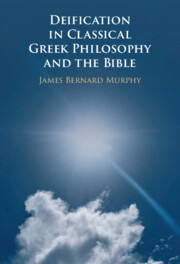Book contents
- Deification in Classical Greek Philosophy and the Bible
- Deification in Classical Greek Philosophy and the Bible
- Copyright page
- Dedication
- Epigraph
- Contents
- Introduction
- Chapter 1 Theology as Anthropology, Anthropology as Theology
- Chapter 2 Heroic Deification in Ancient Greek Religion
- Chapter 3 Ironic Deification in Socrates
- Chapter 4 Civic Deification in Plato
- Chapter 5 Developmental Deification in Aristotle
- Chapter 6 Deification as Intimacy with God in the Bible
- Conclusion
- Acknowledgments
- Select Bibliography
- Index
Chapter 6 - Deification as Intimacy with God in the Bible
Published online by Cambridge University Press: 10 July 2024
- Deification in Classical Greek Philosophy and the Bible
- Deification in Classical Greek Philosophy and the Bible
- Copyright page
- Dedication
- Epigraph
- Contents
- Introduction
- Chapter 1 Theology as Anthropology, Anthropology as Theology
- Chapter 2 Heroic Deification in Ancient Greek Religion
- Chapter 3 Ironic Deification in Socrates
- Chapter 4 Civic Deification in Plato
- Chapter 5 Developmental Deification in Aristotle
- Chapter 6 Deification as Intimacy with God in the Bible
- Conclusion
- Acknowledgments
- Select Bibliography
- Index
Summary
If any book could be said to condemn the whole idea of human beings attempting to become like God, then surely it is the Bible. At the very beginning of Genesis, a serpent (later identified as Satan) tempts Eve with the promise that, if she disobeys God by eating of the tree of the knowledge of good and evil, then she will be “as a god.” According to the Bible, the root of all evil is pride; and pride means precisely thinking that we could become divine. Jesus himself is condemned by the Jewish priests for the blasphemous arrogance of claiming to be divine. And yet, the Bible also promises the faithful that they can become “partakers of the divine nature.” What the Bible condemns, of course, is self-deification. If we surrender to God’s love and seek intimate relation to him, God promises to transform us into creatures who possess divine sanctity and everlasting life. The biblical God is less a paradigm of perfection that we might imitate and more a divine person with whom we might have a loving relationship. According to the Bible, we are divinized not by merely imitating God but by loving and being loved by him.
Keywords
- Type
- Chapter
- Information
- Deification in Classical Greek Philosophy and the Bible , pp. 267 - 304Publisher: Cambridge University PressPrint publication year: 2024

